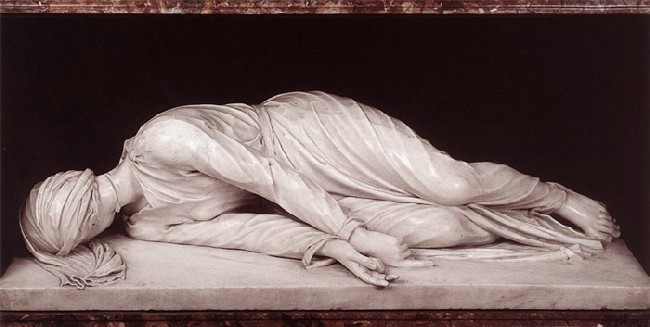
"Historians credit the building of a unified European culture to the pilgrimage to Santiago de Compostela."
Above is a quote in the "Those-Influential-Benedictine-Monks Category" about the "El Camino de Santiago" (The Road of Saint James) which is the road pilgrims traveled (for months and sometimes for years) in the middle ages to get to Santiago, Spain, where the remains of St. James the Apostle are enshrined after having been discoved there about 800 AD marked by a falling cloud of stars over a field (a compostela).
The shrine in Santiago de Compostela — St. James of the Starry Field — is in northwestern Spain. The word Santiago is Spanish for a shortened version of Saint James ("Saint James" ("Sanctus Jacobus") became "Sant' Iago," which became "Santiago").
Here is the connection to Benedictine monasticism. It was the influence of Cluny, the Benedictine monastery, that sparked the great interest in making a pilgrimage to Santiago, Spain, during the middle ages and that made Santiago, along with Rome and Jerusalem, one of three great pilgrim destinations.
Today pilgrimages to Santiago de Compostela along the various routes of the El Camino de Santiago are rapidly increasing.
First quote above from: Catholic Culture
For a good overall summary of the El Camino de Santiago geared for the modern pilgrim see the "Ideal Spain" web site.
For a description of the various routes taken by pilgrims and the ancient non-Christian traditions that may have influenced traditions adopted by the pilgrims see Europe in the UK Culture
For an account of a 2004 pilgrimage made by monks from Papa Stronsay monastery (most northerly early Christian monastery ever found, situated on see Papa Stronsay, an island in Orkney, north of Scotland).
Keithpp's Blog has another excellent overview of the Compostela pilgrimage.
For a long and excellent discussion see the "2000 Years of the Camino de Santiago: Where Did It Come From? Where Is It Going?" prepared by the Confraternity of Saint James.
The above article concludes with the following quote about those who show hospitality to the pilgrims today in much the same way as it was done in the Middle Ages, often by the Benedictines:
"Conclusion
"And that brings me to the end of this over-lengthy address. There is an old saying that one's pilgrimage does not end in Santiago - it begins there, and I am sure that all of us have discovered the truth of that through experience. We return to the lives we left; we are the same, yet not the same; we have gained new perspectives, our experience has reaffirmed some fundamentals that we knew all along. The values we come to appreciate on the Camino and which, I assume, are what have brought us together here today, transcend all the barriers: age, language, race, religion, economic status and educational level. The world - our society - so often seems at odds with those values. To me, and, I suspect, to you also, the pilgrimage to Santiago offers a hopeful vision of how things might be different."
"Well, we are in good company. I recently heard a story about Don José María Alonso, the priest at San Juan de Ortega, whom some of you may remember, who has been attending pilgrims in his particular spot on the Camino for more than 40 years. When Larry Boulting and his crew were there in 2002 filming "Within the Way Without", which is being screened on Sunday afternoon, his crew - described to me as "a pretty irreligious and hard-boiled bunch" - was somewhat confused and sceptical about what the Camino was all about. They could understand what the pilgrims were doing, or thought they could, but they didn't understand what a life-long hospitalero got out of it. So, over some of the famous garlic soup, they asked Don José María to explain what he thought that he and everyone else connected with the Camino were doing. He, in that characteristic way of his, merely shrugged and
replied "Oh, just changing the world, that's all...". Amen."
____________________________
Footnotes
Update July 7, 2010: added link to Keithpp's Blog.
Saturday, May 10, 2008
Santiago de Compostela -- The Roads that unified Europe
Subscribe to:
Post Comments (Atom)









No comments:
Post a Comment